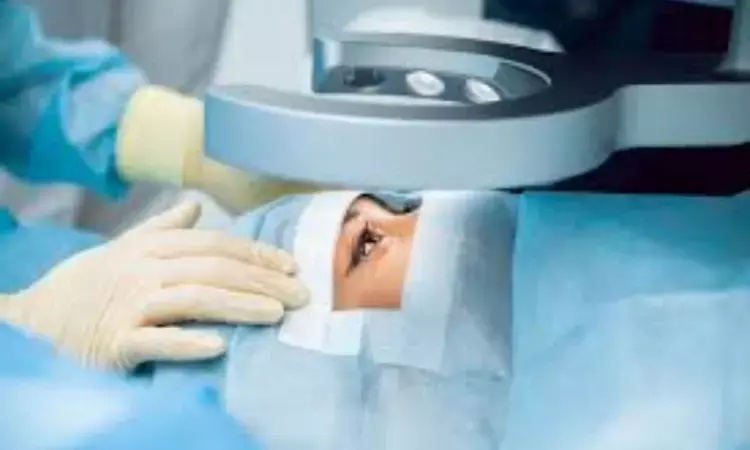- Home
- Medical news & Guidelines
- Anesthesiology
- Cardiology and CTVS
- Critical Care
- Dentistry
- Dermatology
- Diabetes and Endocrinology
- ENT
- Gastroenterology
- Medicine
- Nephrology
- Neurology
- Obstretics-Gynaecology
- Oncology
- Ophthalmology
- Orthopaedics
- Pediatrics-Neonatology
- Psychiatry
- Pulmonology
- Radiology
- Surgery
- Urology
- Laboratory Medicine
- Diet
- Nursing
- Paramedical
- Physiotherapy
- Health news
- Fact Check
- Bone Health Fact Check
- Brain Health Fact Check
- Cancer Related Fact Check
- Child Care Fact Check
- Dental and oral health fact check
- Diabetes and metabolic health fact check
- Diet and Nutrition Fact Check
- Eye and ENT Care Fact Check
- Fitness fact check
- Gut health fact check
- Heart health fact check
- Kidney health fact check
- Medical education fact check
- Men's health fact check
- Respiratory fact check
- Skin and hair care fact check
- Vaccine and Immunization fact check
- Women's health fact check
- AYUSH
- State News
- Andaman and Nicobar Islands
- Andhra Pradesh
- Arunachal Pradesh
- Assam
- Bihar
- Chandigarh
- Chattisgarh
- Dadra and Nagar Haveli
- Daman and Diu
- Delhi
- Goa
- Gujarat
- Haryana
- Himachal Pradesh
- Jammu & Kashmir
- Jharkhand
- Karnataka
- Kerala
- Ladakh
- Lakshadweep
- Madhya Pradesh
- Maharashtra
- Manipur
- Meghalaya
- Mizoram
- Nagaland
- Odisha
- Puducherry
- Punjab
- Rajasthan
- Sikkim
- Tamil Nadu
- Telangana
- Tripura
- Uttar Pradesh
- Uttrakhand
- West Bengal
- Medical Education
- Industry
Fluocinolone acetonide implant for birdshot retinochoroiditis improves retinal and macular function: BMJ

Cataract Surgery
London, UK: In a new study conducted by Sofia Ajamil-Rodanes and team it was found that intravitreal implant (Iluvien) may have a therapeutic impact in the treatment of Birdshot-related vascular leakage, cystoid macular edema (CMO), and retinal impairment. Choroidal lesions, on the other hand, appear to persist with no discernible response to therapy. The findings of this study were published in the British Journal of Ophthalmology.
The purpose of this study was to report on the treatment results and efficacy of the fluocinolone acetonide 0.19 mg Iluvien in reducing retinal and choroidal inflammation in 11 patients with birdshot retinochoroiditis.
This was a retrospective, interventional case series from a single center. Improvement in vascular leakage on fluorescein angiography (FA), effect on CMO, and resolution of hypo fluorescent lesions on indocyanine green angiography (ICGA) was the primary efficacy endpoints; secondary measures included improvements in pattern and full-field electroretinogram (PERG; ERG) parameters. Intraocular elevation and cataractogenesis were used as safety outcome metrics.
The key findings of this study were as follow:
1. With an average follow-up of 31 months (range 12–36 months), 15 eyes got Iluvien implants.
2. Prior to the implant, 5 (33.3%) of the eyes had received 0.7 mg dexamethasone intravitreal implant (Ozurdex).
3. At baseline, FA exhibited indications of vascular leakage in all eyes. FA revealed that 73.4 percent of eyes had no leakage during months 6 and 12, increasing to 84.6% by month 24.
4. CMO was present in three of the eyes in our investigation at the start. All eyes had perfect CMO resolution 6 months following the Iluvien implant.
5. The distinctive hypo fluorescent lesions on ICGA remained constant one year after implant implantation in all instances.
6. There was baseline ERG evidence of a high prevalence of peripheral cone system malfunction, and the majority of patients had PERG evidence of macular dysfunction.
7. Following therapy, the majority of patients' retinal and macular functions improved or remained constant.
Reference:
Ajamil-Rodanes S, Testi I, Luis J, et al, Evaluation of fluocinolone acetonide 0.19 mg intravitreal implant in the management of birdshot retinochoroiditis, British Journal of Ophthalmology 2022;106:234-240. doi:10.1136/bjophthalmol-2021-320961
Medical Dialogues consists of a team of passionate medical/scientific writers, led by doctors and healthcare researchers. Our team efforts to bring you updated and timely news about the important happenings of the medical and healthcare sector. Our editorial team can be reached at editorial@medicaldialogues.in.
Dr Kamal Kant Kohli-MBBS, DTCD- a chest specialist with more than 30 years of practice and a flair for writing clinical articles, Dr Kamal Kant Kohli joined Medical Dialogues as a Chief Editor of Medical News. Besides writing articles, as an editor, he proofreads and verifies all the medical content published on Medical Dialogues including those coming from journals, studies,medical conferences,guidelines etc. Email: drkohli@medicaldialogues.in. Contact no. 011-43720751


